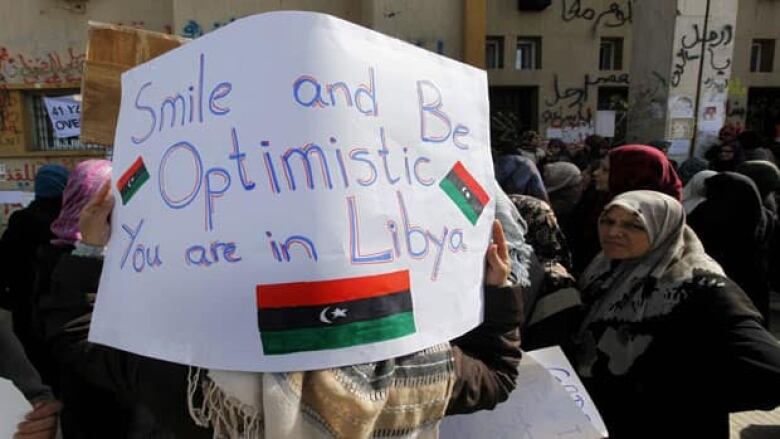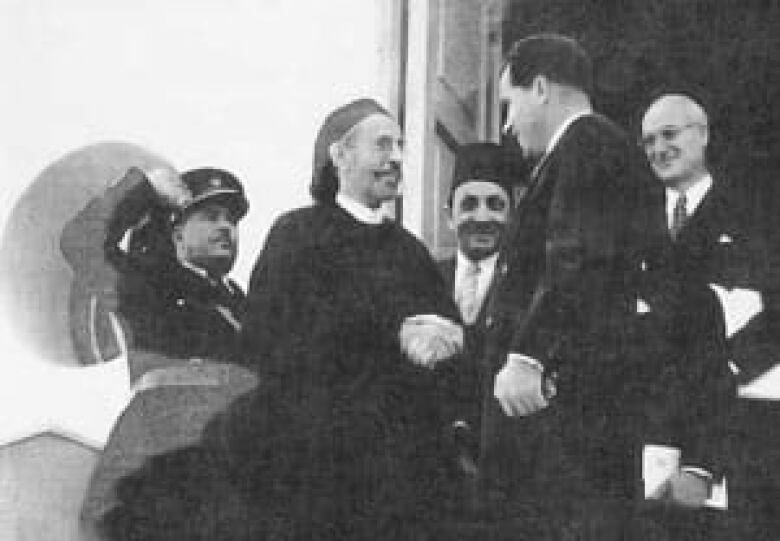The role of tribalism in Libya's history
Regional divisions of the past don't mean future unified state isn't possible, say experts

When the spirit of protest and revolution crossed over from Egypt into neighbouring Libya in mid-February, some experts expressed caution: political upheaval in the North African nation could prove disastrous, they warned.
The tribes of Libya
Even to this day, Libyans have identified themselves based on tribal alliances. Berbers, the indigenous people of North Africa, along with Arabs, make up 97 per cent of Libyas population. The major tribes of Libya, as divided by the countrys four major regions, include:
Cyrenaica:Al-Awagir,Al-Abaydat, Drasa, Al-Barasa, Al-Fawakhir,Al-Zuwayya, Al-Majabra
Tripolitania: Warfalla, Awlad Busayf,Al-Zintan, Al-Rijban
Syrte: Al-Qaddadfa, Al-Magarha, Al-Magharba, Al-Riyyah, Al-Haraba, Al-Zuwaid, Al-Guwaid
Fezzan: Al-Hutman, Al-Hassawna;Toubou,Tuareg
Centuries of tribal historymeant a transition from dictatorship to democracy would not be a smooth one, they said.
Louis Delvoie, a former Canadian ambassador to Algeria in the early 1980s,was among the skeptics.
"There are, in Egypt, some well-established national institutions such as the armed forces, the government, the judiciary," he said. "They may not be perfect, but they are established. There's nothing comparable in Libya."
There are those, however, who point to Libya's past as an indication that a successful transition to a unified democratic Libyan state is, indeed, possible.
The history of a unified Libya can be traced back to pharaonic Egypt, says Bruce St. John, who has written five books on Libya. Egyptians were the first to refer totheregion as Libya.
During Roman times, Libya was carved into three separate states: Tripolitaniain the west, Cyrenaicain the east and Fezzanin the south.
"That split was, in large part, a product of the geography of the region," St. John said. "Tripolitania is separated from Cyrenaica both by the Gulf of Sert and a vast sand sea coming down between the two areas. Fezzan, composed of a series of oases, is separated from the other regions by another sand sea."
Libya'spopulation was and still is concentrated in the northern part of the country, distributed between Cyernaica and Tripolitania. These states, and the tribes that lived in them, remained independent until 1931 when Italy, which had colonized the area in 1911, violently quashed a rebellion and unified Libya again.
"There was a kind of urgency and brutality in the kind of exploitation of the areas Italy took in the first part of the 20th century," said Aurel Braun, a professor of international relations and political science at the University of Toronto.
Post-war Libya
Once the Allies took Italy's North African colonies in 1943, Libya was split up again, with Great Britain taking control of Tripolitania and Cyrenaica, leaving Fezzan to France.
"Then you have a march to independence where you had three very different regional areas finding a difficult time to work together," St. John said. "They agreed they needed to have some kind of a national government, so they decided to coalesce around King Idris I, who was the grandson of the founder of the Senussi order, a religious order founded in Cyrenaica."

A new unified Libya emerged in 1951, but the king's lack of interest in the day-to-day affairs of thestate fostered a divide between the east and west, said St. John.
"After 1951, there was still a great deal of regionalism because King Idris was more of a religious type of leader, not particularly interested in politics," he said. "He therefore tended to focus his activities on religious affairs in Cyrenaica and delegated most political decisions to others.
"This led to a certain over-concentration of state resources on Cyernaica, which was obviously resented in the other regions and led to a lot of corruption."
Jews in Libya
Although the majority of the population is Sunni Muslim, Libya has historically been home to a sizeable Jewish population. Many Jews migrated to the area from Egypt during Greek and Roman times, and were instrumental in anti-Roman uprisings. Simon of Cyrene, a Libyan Jew, helped to carry the cross of Jesus crucifixion. Jews experienced persecution while Libya was under Italian occupation, as well as during Gadhafis rule. The last Jew left Libya in 2003.
Basic geographyalso contributed to thefeelings of ill will during the reign of King Idris, says Braun.
"The way the country developed between Tripoli (the capital of Tripolitania) and Benghazi (the capital of Cyrenaica), there were issues made bigger by a lack of communication because of the sparse population between them," he said. "The networks established between the two cities were rudimentary at best. So, many in the west felt left out."
Shaky monarchy made coup inevitable
In 1969,Moammar Gadhafi, a colonel in the Libyan army who claimed to be advocating on behalf of tribes in the west who felt King Idris was favouring the eastern regions, led a coup to overthrow the king.
Such a move was pretty much inevitable given theinstability in the region at the time, St. John said, althoughit had little to do with any sort of tribal divide.

"The real problem with the monarchy was that King Idris and the regime were very conservative in their socio-political feelings," he said. "This was a time when [Egyptian President Gamal Abdel] Nasser was a very strong voice for Arab unity, and he picked on regimes like the Libyan monarchy because of their Western ties.
"The monarchy was simply unable to adjust to this going trend of Arab unity [in time] to cause its own people to believe that it really was a supporter of the Arab world as opposed to simply another corrupt regime with ties to the West."
In the years since Gadhafis seizure of power, he has been instrumental in stoking tribal differences and disagreements, although the recent protests show his efforts have not been successful, Braun said.
"We know that tribalism was crucial in the politics of Libya [and] Gadhafi was rather clever in exploiting tribal differences, and this was one way in which they kept control," he said. "I think we miss the big picture when we say people in the eastern part of the country are more intent on having democracy or preserving their dignity than people in Tripoli, under Gadhafis control.
"I do not think there are vast differences in the aspirations of the Libyan people, regardless of what tribe they come from."
Libyans want united state
Bruce St. John echoesBraun's sentiments.
"They're all Sunni Muslims; they all speak Arabic," he said. "There is nothing to speak of that would cause someone from Cyrenaica to go into Tripoli and feel uncomfortable. It's not like that."
Outside forces had more to do with the current revolution than anyrivalry between the east and west or Cyrenaican resentment over Gadhafi's Tripolitanian coup in 1969, says St. John.
"It was all driven by the freedoms sought in Tunisia and Egypt, freedoms Gadhafi has long denied," he said. "Even though it started in the east, it's picked up considerable momentum as it's moved west. It's a different motivation for the revolution today than what we saw under Gadhafi."
Braun is quick to point out that Gadhafi has structured his regime around the Libyan capital of Tripoli, much like the Roman empire was centred around Rome. The only reason protests have been weaker in western regions, he says, is simply because Gadhafis forces are stronger there.
"We can see this happening in suburbs of Tripoli where there have been attempts of demonstration with reactions of very brutal repression," Braun said. "Its not as if we saw people rising against the Gadhafi regime only in one part of the country. This happened in the capital itself.
"Gadhafi is more efficient and better positioned around Tripoli."
History points to optimistic future
In the end, Libyans will look to their history to teach them how to effectively structure their country in the future, said St. John.
"The first constitution called for two capitals and regional capitals," he said. "The government would rotate through, and it was just unmanageable, expensive and just led to more corruption. At one point, Libya had more people working for the government per capita than any other country in the world.
"I don't think they want to go back to that kind of a situation. They see the value in a unified state, and they'll move in that direction."
One of the strongest arguments in favour of unification is that it's the most effective way for citizens to benefit from Libya's vast oil supply, said St. John.
'They have to stay together, because that's the only way they can effectively manage their resources.' Bruce St. John, author
"One of the great failures of the Gadhafi regime is that after 40 years, they've almost totally failed to diversify the Libyan economy," he said. "The economy today is almost totally dependant on the export of oil and gas. Most Libyan families are connected to the state because those are the only jobs available.
"If you take that economic structure with the fact that there are five major oil basins in Libya in addition to offshore oil, it would be very difficult, if not impossible, to separate it into three areas and still have a nationwide oil production [and] distribution system.
"I think the Libyans will realize that, from a practical standpoint, they have to stay together, because that's the only way they can effectively manage their resources."
Braun says the act of removing an oppressive dictator like Gadhafi, while encouraging, "is not a guarantee; it's merely an opportunity."
He does, however, agree a unified Libya is entirely within the realm of possibility.
"We go down the wrong road if we keep emphasizing differences," Braun said. "They may be fascinating historically but not significant politically."
With files from Andre Mayer












_(720p).jpg)


 OFFICIAL HD MUSIC VIDEO.jpg)
.jpg)



























































































